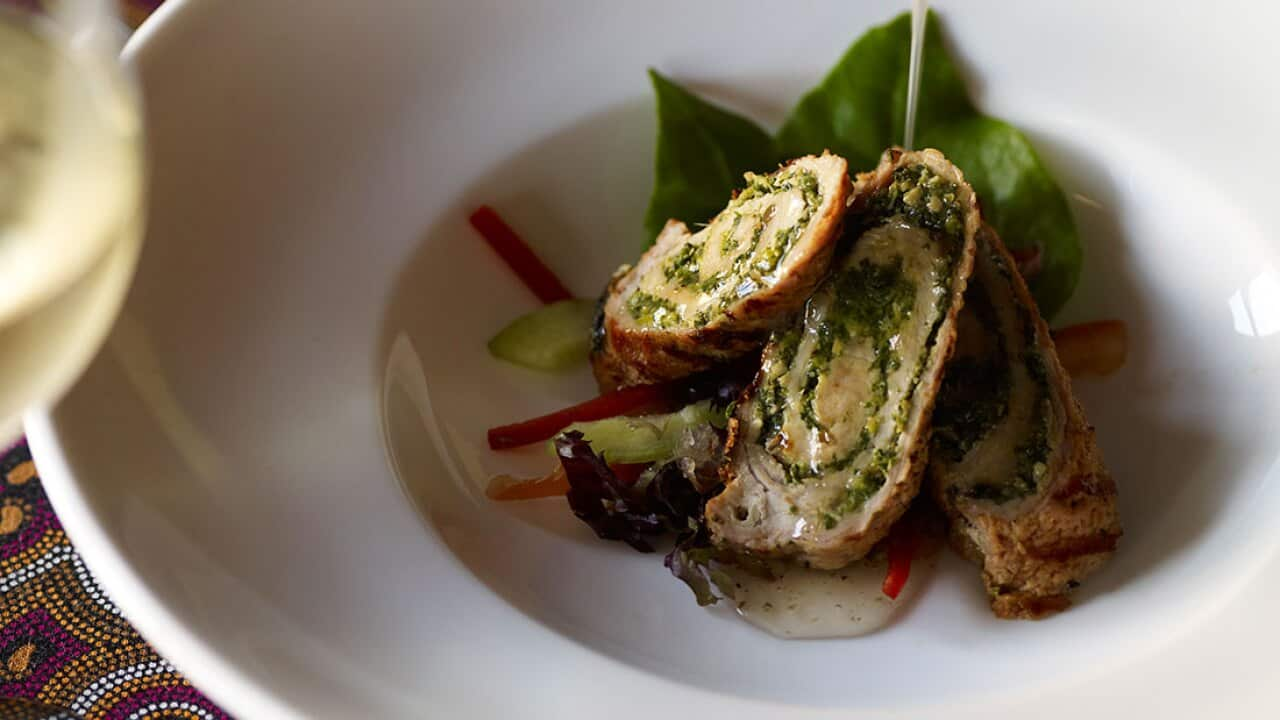Burdekin plums
Burdekin plums are closely related to mangoes and can be eaten raw, added to salads or even use to make wine and liqueurs.
Brush cherries
Brush cherries have a pink blush and a crisp, refreshing texture. Eat them fresh or serve in a fruit salad or use to make jams.
Bush cucumber
Bush cucumber is a vine-bearing small, green fruit. It was enjoyed by Aboriginal people for its great flavour and also because it keeps well once picked. It's delicious in salads, relishes and pickles.
Cedar Bay cherries
Cedar Bay cherries have a delicious soft, sweet flesh and range in size from cherry pips to cumquats. These cherries are tasty eaten as they are, but can also be added to sweets.
Davidson's plums
Davidson’s plums grow on palm-shaped trees and have a sharp, sour flavour. This plum is great in sauces, jams and marinades and can also be used to make liqueurs.
Desert lime
Desert lime is a true citrus and has a slightly sour taste and juicy flesh. It looks like a small lemon, with pock-marked rind. Its tartness makes it perfect in jams and marmalades, in marinades for seafood and it is also delicious as a sorbet.
Finger limes
Finger limes (red and yellow) are so-called due to their elongated shape. They have a lovely lime flavour and are full of caviar-like jewels of juice. Use them to make a dressing for seafood, particularly oysters, and add to cocktails.
Illawarra plum
Illawarra plum (also known as Daalgaal and Gidneywallum) has bright purple fruit and a plum wine flavour. Add the plums to desserts, such as tarts or cakes, or use to make jams.
Kakadu plums
Kakadu plums have been identified as the richest source of vitamin C on the planet. That’s 50 times the concentration found in oranges! Use them in jams, syrups and sauces.
Kutjera
Kutjera is also known as the desert raisin or bush tomato and is part of the tomato family. Of the 100 varieties of wild tomatoes in Australia, only six are edible. Kutjera are full of vitamin C and are a rich source of potassium. Kutjera can be made into sauces and relishes, and dried and added to herb mixtures.
Lemon myrtle
Lemon myrtle is a versatile herb with a fresh, lemon-lime flavour. It can be ground and dried or used fresh. It’s perfect for adding to sauces and marinades for a fragrant lift and also works well with sweets, such as cakes and sorbets.
Marsdenia
Marsdenia (also known as the bush banana, kurgula, langkwe or myakka) has many edible parts, from the avocado-shaped fruit that tastes similar to snow peas to the stem, young leaves and even the sap. The young leaves are great in salads while the fruit is delicious boiled and tossed with butter, pepper and herbs.
Molucca raspberries
Molucca raspberries look very much like European varieties and have a soft, sweet flesh. As you would regular raspberries, use in jams and sweets.
Mountain pepper
Mountain pepper (also called Tasmanian pepper) is much like regular pepper, however both the pepperberries and the leaves are edible. You can use mountain pepper as you would any other pepper. The dark berries can infuse sauces with a rich, plum colour.
Muntries
Muntries, also referred to as muntharis, have an apple-like flavour and Aboriginal tribes often ground them into a paste to make into fruit bars. Muntries work well with both sweet and savoury flavours – add them to fruit salads or marinades.
Native thyme
Native thyme can easily be grown in the home garden and can be used as you would regular thyme; however, a little does go a long way, so use sparingly. Add it to marinades, spice rubs and to flavour sauces.
Passion berries
Passion berries are part of the native tomato family but have a sweeter, fruitier flavour than the kutjera. Yellow in colour, the berries taste like a medley of banana, caramel and vanilla. Add them to fruit salads or use to make sweet syrups and jams.
Quandongs
Quandongs are highly nutritious, bursting with twice the vitamin C of an orange. These fruits are delicious in everything from sweet pies to savoury sauces for meats.
Riberry
Riberry, often called lilli pilli, are small reddish-pink fruits, with a sweetly tart flavour, that are bursting with essential minerals. Add to ice-creams and chocolate treats. It's also great in savoury dishes.
River mint
River mint has a flavour that’s similar to spearmint and was happily embraced by early settlers for its familiar taste. Add to roast lamb or use to make a jelly for roasts.
Salt bush
Salt bush has become incredibly popular in the high-end restaurants of Australia. This nutritional bush has many uses, from salads to stir-fries, and can also be added to pasta dishes.
Sea parsley
Sea parsley (often called sea celery) is a close relation to European parsley and looks incredibly similar. Thriving in composted seaweed and often submerged by salt water, this native parsley has a distinctive sea-fresh flavour. Use it in spice mixtures, dressings and marinades for seafood.
Tanami apple
Tanami apple is another member of the bush tomato, which produces large, golf ball-sized fruit with a melon-flavoured flesh and bitter black seeds. Scoop out the seeds and fill the fruit with cheese and spices before barbecuing.
Wattleseed (acacia)
Wattle is familiar to most Australians, and not all the seeds are edible, but those that are have a range of uses in the kitchen. These protein-rich seeds can be cooked into breads and cakes, added to spice mixtures and rubs, and can even be roasted and added to desserts.






